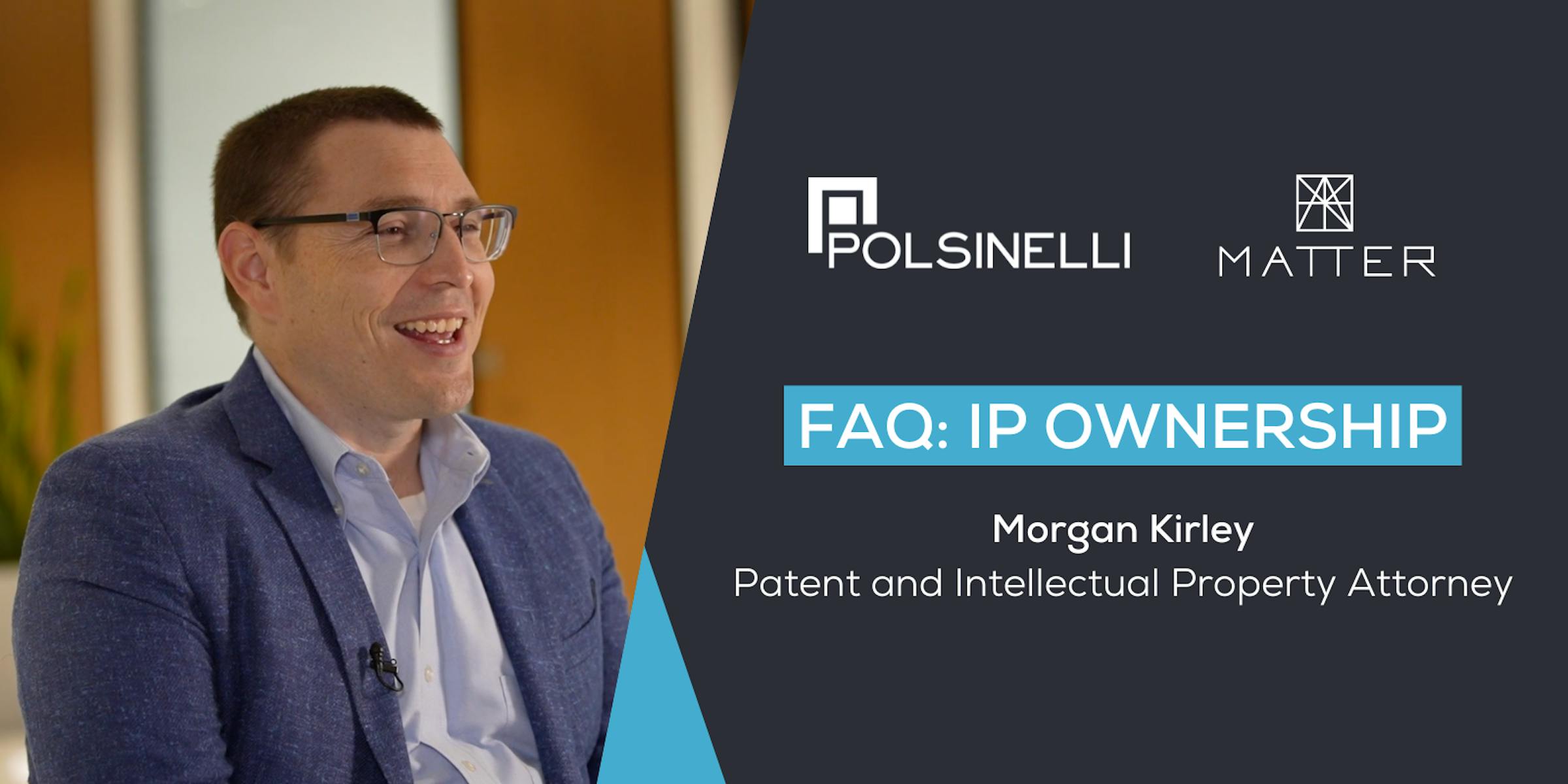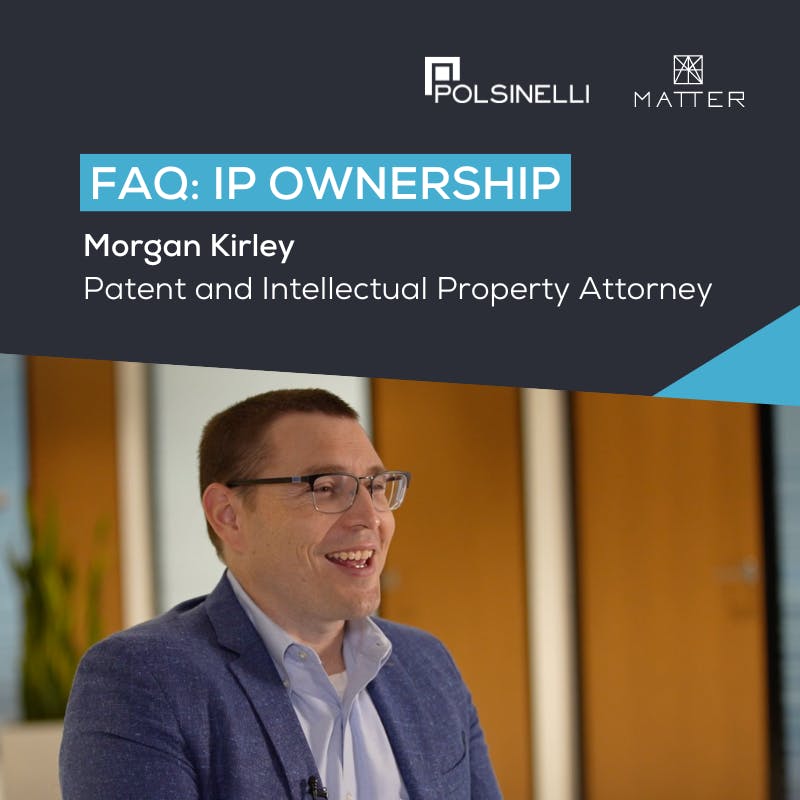Key tips on how startups can protect their IP
Patent and Intellectual Property Attorney Morgan Kirley shares advice for healthcare startups
As an entrepreneur developing a new solution, you want to ensure your intellectual property (IP) is protected. But it’s not always easy to navigate this legally, so we sat down with MATTER partner Morgan Kirley, patent and intellectual property attorney at Polsinelli, to discuss the answers to frequently asked questions from healthcare startups.
1. What are potential hazards of relying on non-disclosure agreements (NDAs)?
There’s a common misconception that NDAs are bulletproof or that you don’t have to think twice before getting into one or relying on one. But if you don’t fully trust the other entity you’re working with, you have to ask yourself, “What if they break it? Will I sue them? Are there any loopholes?”
Frequently, NDAs aren’t non-compete agreements, so the other entity can compete against you — they just can’t disclose how they got the information. So, once the information is shared, the counterparty can then take that information and compete against you without actually disclosing the information.
This can make it risky to solely rely on NDAs for protecting your intellectual property. But if you do consider whether you’re comfortable with your information being out in the public in two-to-three years and how you might defend yourself if the other party violates the agreement.
2. What should entrepreneurs think about when sharing IP with a third party entity?
Entrepreneurs should consider three things: containment, ownership and control.
-
Containment: With containment, once the information is out, you might not know where it’s going. You don’t know what the other company or entity is going to do with that information, whether they’re going to develop their own line of products or incorporate it into their business strategy in ways you couldn’t anticipate. Once the cat’s out of the bag, it’s difficult to get it back in.
-
Ownership: Even if things progress in a way where great things are discovered and the collaboration is very effective, who owns it? Which parts? All of it? Some of it? It’s helpful to have a governing agreement that both sides can reference.
-
Control: Control goes hand in hand with containment and ownership. Know who has the right to use the information and whether they can use it for regulatory filings.
There are agreements built for this purpose, so I would advise using something that covers at least these three areas.
3. If entrepreneurs are collaborating on the development of a product with a customer, who owns the IP?
It depends on the context. Historically, “works for hire’’ are generally, by default, owned by the entity or person commissioning them, but there are exceptions. There are contracts and agreements you can put in place that change that default, and it’s best to put it in writing. If you want to own it, you should specify: “Yes, this is a custom-made product, but we at least retain rights to X, Y or Z.”
4. Can entrepreneurs prepare and file their own IP without an IP lawyer?
Certainly, there are famous instances of entrepreneurs doing so because the costs are so high: the founder of Theranos famously filed her own patent while she was in school and the founder of Spanx did something similar.
However, it can backfire. Many times those filings aren’t as complete and don’t have the necessary support. And if they’re done in such a way where errors aren’t caught until more than 12 months after filing, they’re either very difficult to fix or are simply unfixable. In general, if you’re in an area that is IP heavy, an IP lawyer is a must-have, not a want-to-have.
5. How do you balance the need to protect IP with the costs associated with filing and pursuing patents?
Most companies have several great ideas they want to protect. So the question is: how much and when?
For international filings, you have to file before it’s publicly disclosed: before it’s put on a website, any offers are for sale, actual sales and before you tell your friends about it. You need to be very careful if you’re doing international filings.
In the U.S., there’s a one-year grace period. Once you publicly disclose an idea, you have up to one year, or 12 months, to protect that via filing. To the extent a company’s trying to cut costs or make their budget go as far as possible, I’d recommend focusing on the U.S. first. About 60 percent of global trade in commerce is in the U.S., and it’s still the primary patent jurisdiction.
In terms of balance, you need to decide which of your products are most important and mission-critical. If you have to pick, focus on the ones that are covering your most important products.
If something is in more long-term R&D and won’t be released for a couple more years, then you can use that time to focus on the things you’re selling and making money off of. Think hard about whether it’s something that you’re researching or something that’s real and whether it will give you a competitive advantage.
6. What can entrepreneurs do to protect their IP besides filing a patent?
The easy answer to that is a trademark. They’re much more cost-effective, but they don’t provide the same types of protection. A trademark has to do with your brand names, logos and other items related to brand recognition. Patents are much more time-consuming with a much more comprehensive and expensive process.
7. How often should a startup reassess its IP position?
Keep in mind how often you’re making updates, adding new ingredients and changing components — if you’re not careful, you may outgrow your existing protection. Chances are your competitors are counting down the days until your original patent or IP protection is no longer acting as a safeguard.
8. Do customers typically care if a product is covered by IP or not?
No, they don’t — it’s the competitors that notice. The people who notice whether you have patents or not are the people trying to copy you. They’re trying to figure out how to do something like you but differently in order to take away some of your market share.
9. What should startups consider to avoid infringing on the IP rights of others?
At the startup stage, and particularly while still in R&D, it’s okay for startups to be in stealth mode. IP can be very costly, and all these analyzes can be complicated. If you’re so concerned about analyzing thousands and thousands of patents, you may forget to develop your own product. Once you get to the point where you have your minimally viable product and prior to launch, you should start thinking about it. Until that point, you won’t be on many people’s radar.
10. What other advice would you give startups regarding IP?
There are technologies that are more IP-light or IP-heavy — for example, pharmaceuticals is IP-heavy. Across most technology areas, patents are becoming more frequent, not less. Ten or 20 years ago, one or two patents covered a process or composition; now sometimes 50 or 100 are needed. The scale at which the competitors are building their patent and IP war chests is quickening. So, entrepreneurs should be mindful of that to be able to compete.
Interested in hearing from more Polsinelli lawyers? Hear data privacy and cybersecurity advice from Privacy and Cybersecurity Attorney Michael Waters.
About Polsinelli
Polsinelli is an Am Law 100 firm with more than 950 attorneys in 23 offices nationwide. Recognized as one of the top firms for excellent client service and client relationships, Polsinelli is committed on meeting our clients’ expectations of what a law firm should be. Our attorneys provide value through practical legal counsel infused with business insight with a focus on health care, real estate, finance, technology, private equity, and corporate transactions. Polsinelli LLP in California, Polsinelli PC (Inc) in Florida.




